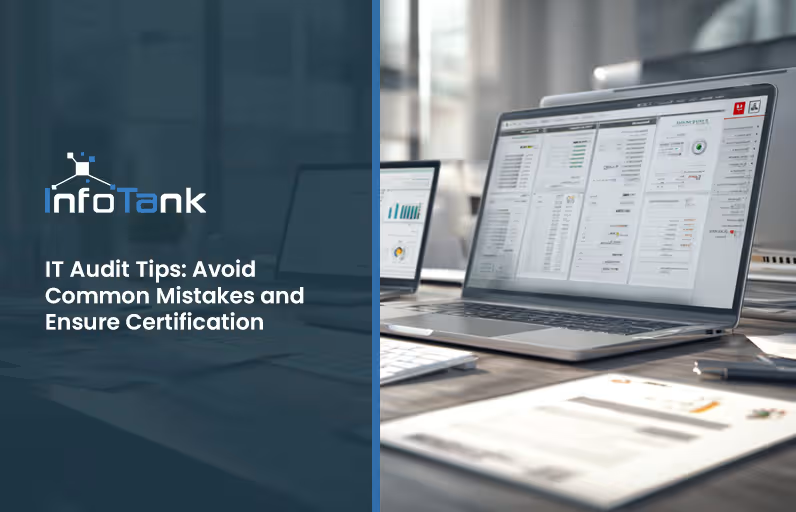
Six IT Management Mistakes and How to Avoid Them
Finding an MSP (managed service provider) comes with the territory of building and adapting. With an MSP that matches your business needs, you can incorporate the best IT management solutions available for your business. But first, learning how to avoid IT management mistakes will greatly improve your options.
As a business owner in Atlanta, GA, you work hard to ensure your company’s future. If you own a small business, you rank as one of the most integral parts of Georgia’s economy.
In 2021, Metro Atlanta CEO reported that small businesses employ 43.14% of working people. However, the pandemic created an intense financial strain on several small businesses, forcing many of them to close for good.
While businesses closed for a diverse range of reasons, IT management mistakes make up a sizable portion. Alongside the financial struggles, the pandemic also increased the already growing need for technological resources and adaptability. Even large, seemingly robust Atlanta systems aren’t immune from IT management mistakes.
Businesses that fail to keep up with tech demands fall behind and damage their reputation. Like any discerning business owner, you likely use caution when choosing services for your business. You want to save money, budget properly, and continue building.

1. Cutting or Avoiding Necessary Resources
When your business requires technical solutions to function appropriately, you can’t afford to skip out on the resources necessary to achieve smooth transactions and internal structure. You might feel tempted to lump management services with general IT operations, but don’t make that mistake! It significantly curtails your in-house resources while allowing new problems to grow.
Skilled People
Finding skilled people ranks highly in a business’s success. Retaining skilled people takes precedence above all else.
When you have a strong in-house IT team, you want to keep them on board for years to come. To do this, you must delegate tasks appropriately.
When you lump all the management tasks onto your in-house team, you lose time, money, and skill that would better serve in-house tasks. Plus, overworked and understaffed teams will seek other opportunities over time. In-house IT teams often lack the skills to manage your entire system.
Therefore, forgoing managed services can set your team and business up for failure in the long run. When you delegate management tasks to a strong MSP, you’ll retain your IT team since they perform the in-house development they applied to do.
Technology That Matches Your Business
Some resources take the form of technology. As a business owner who stays on top of things, you want the latest and the best in the industry. Surely, new, evolved systems keep your business on top of everything, right?
This isn’t always the case.
Sometimes, the most recent system update or version will help your business go above and beyond. But often, it just adds an unnecessary drain on your business’s current functions. An MSP can guide you about the best system for your business, when it needs an update, and whether your system needs a change.
2. Lack of Communication
Strong communication seems like a given with IT strategic management. However, many business owners struggle to pin down what they need. You know you need solutions to improve system functions and free up your IT team. You may not know what that looks like for your business.
Not Specifying Your Goals
When you embark on the process of seeking management solutions, identify your goals in detail first. Think about your business’s technology weak points.
What have you already experienced? What have similar businesses experienced that you want to avoid?
Additionally, discuss goals and pain points with your IT team. Ask them to write down issues they’ve encountered and how to mitigate them. Use their direction to guide your search for management solutions.
When you have a defined set of goals, you have a detailed idea of what sort of management supports your business needs.
Deficient Support
Whether you have an MSP or not, a lack of technical support creates significant problems. If you have an unresponsive MSP, you pay for subpar managed services that solve nothing and drain your finances. Without technical support, any cyber threats or system failings can sit unnoticed for long periods.
Strong support requires consistent monitoring around the clock, like InfoTanks’ endpoint detection and response. Such services stay on top of threats or system breakdowns, ensuring you stay informed. When you know what to expect, you can respond and delegate appropriately.
When you have a prompt response, you maintain a strong public reputation as a competent business that stays on top of any issues. Your IT team can promptly resolve problems, and your employees will get back to their tasks more quickly.
3. Not Having a Backup Plan
No matter how many precautions you put in place, your business will still run into unexpected obstacles now and again. When this occurs, you need a strong backup plan that allows your employees to continue serving clients securely. You also need secure storage to make business data available to the appropriate parties while keeping it safe.
If you think you have a failsafe business, think again.
Atlanta has a climate conducive to tornadoes in the spring. Cybercriminals have also targeted big businesses in our busy city a few times. So, cloud solutions that provide secure, offsite data storage and access ensure that your business can keep moving forward.
For many businesses, data loss puts a foot in the grave. Lost software or client information means rebuilding everything from scratch.
If you get stuck in a situation like this, it can drain you of any saved resources. A backup plan for technology and data keeps your business afloat no matter what.
4. Over-Prioritizing IT
Efficient systems that use niche software play an integral role in any strong business. However, you can place too much emphasis on IT. When you do this, you sacrifice quality and achievement for the techy minutia involved.
As a result, software crashes and leaves a negative user experience for employees using the system and customers who need your products or services. You need strong leadership, expert planning, and effective project management to ensure everyone has a positive experience with all aspects of your IT system.
Putting IT Before Management
The best IT management solutions incorporate all elements your business uses. This includes software, hardware, and the network you use. If any IT element can’t handle your project, you’ll experience delays and time-consuming bug fixes.
Use IT management to develop a game plan and ensure your team keeps all objectives in mind. Ensure your hardware and network can handle new software or software updates. If an element needs an update to function with the project, allot the necessary resources for it to perform well before launching.
Putting IT Before People
Before implementing a new system or software, ensure it addresses the genuine needs of the people using it. If your current system meets those needs, you may not need a complete system overhaul. When you keep people central to your goals, you ensure IT solutions match their needs.
Software should serve the purpose of pleasing people. On one front, you have employees who use the front end to address consumer needs. If you do e-commerce, you have a second front that includes the customers making purchases on your website.
Keep both groups of people at the center of any project; speak with the employees servicing customers. Make notes about what would make their jobs easier in interacting with customers and consider customer feedback during the planning phase. This information will guide any software project to user-centric results.
5. Lacking Protection by Skipping IT Strategic Management
The Atlanta Business Chronicle recently outlined the importance of IT strategic management, citing the cyber attacks on Equifax and the City of Atlanta as examples of IT management failure. The modern business world requires that you take aggressive preemptive action to protect your information.
While you can’t predict how or when a cyber attack will occur, you can prepare.
Cybercriminals will attack your business for myriad reasons. Some want access to sensitive customer information to steal money. Often, small businesses offer an easy target since they use basic systems with few protective measures in place.
Mismanaging Information
While you need to store your business’s data, certain storage systems don’t provide strong protection methods. Ideally, your business data should have different levels of access. Only certain admin levels should have easy access to sensitive data.
Without different levels of admin access, a disgruntled employee can easily access and leak sensitive information. These incidents damage your business’s reputation and cause you to lose customers. Your current staff will spend precious time cleaning up the fallout.
Additionally, improving your information management ensures authorized employees can translate it properly. When an IT manager translates data into readable metrics, your staff will better understand their goals and how to get there. Thus, your business achieves its end goals more efficiently and easily.
Digital Threats
Cybercriminals have many tools to attack small businesses and access financial information, including viruses and hacking skills. Other events, such as malfunctioning software and system failures, also create weaknesses and easy access. While backup storage plays a key role in protecting data, you also need a strong firewall system to prevent leaks and breaches.
A good MSP includes protective firewalls and antivirus software to protect your business assets. They also ensure preventative strategies and protective policies in anticipation of these events. A strong IT management plan takes a dynamic approach that includes prevention and protection.
6. Selecting a Management Provider That Doesn’t Fit Your Business
As a small business owner, you have big plans for your business and staff. You see growth on the horizon and navigate your team toward it. But you need a management provider that can meet your business where it is while offering scalable solutions.
Since many businesses outsource their management needs, the management service industry grows by leaps and bounds. While you have seemingly endless options, you can also choose a provider whose abilities or solutions don’t align with your needs. You want to avoid IT management providers that don’t communicate consistently, have a client overload, or don’t have solutions that match your business needs.
How to Avoid IT Management Mistakes
When searching for complete IT management solutions for your small business, you can dodge these IT management mistakes by implementing the following steps. By taking more time during the communication and planning processes, you’ll ensure you find the MSP that matches your business needs.
1. Identify Your Goals and Weak Points
Before looking into IT management services for your small business in Atlanta, take time to talk with your in-house IT team and service staff. Make a list of the following:
What does your IT team need to succeed?
What elements, such as hardware, network, and software, need updates?
How do you currently store and secure data?
How does your service staff experience your current system?
How would your service staff change the system to benefit their user experience?
What useful feedback can your customers provide?
What IT weaknesses can you identify in your industry right now?
Use this information to curate your IT goals. Your research process will move forward with ease. You’ll also narrow down your options to providers who fit your needs.

Select an MSP With the Best IT Management Solutions for Your Business
Not all MSPs are created equal. With the information you gathered from your team and customers, narrow down your options. When you discuss options with potential providers, make notes on how well they communicated, how many clients they have, and the industries they predominantly serve.
You want a provider who communicates quickly and effectively. They should have experience with clients in your industry and a ready-made list of applicable solutions that match your communicated needs. Understanding your staff’s needs and having clear goals will guide you to IT management solutions and providers that work for your business.



